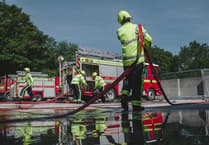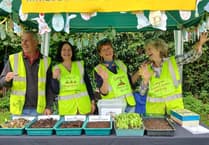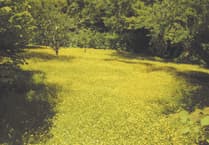A SOUTH Hams church as welcomed visitors from Penang, Malaysia, to celebrate the 200th anniversary of the founding of their school.
Old Frees who have settled in the UK joined them in a service of thanksgiving, along with one man who had travelled from Switzerland, in St George’s Church, Dittisham, last Wednesday.
The service was lead by Fr Will Hazelwood, who spoke of journeys as a time for reflection and the habit of rushing to the destinations, as well as the journey that the Rev Robert Sparke Hutchings made to Malaysia to help the people of the country to get an education.
After the service, gifts were exchanged between members of the Penang Old Frees and the Dittisham congregation, before a lunch at Anchorstone Cafe, which closed for the day to welcome the Malaysian visitors.
The Old Frees convoy, led by Sek Lam Saw, took 73 days to travel from Penang Free School, through Thailand, Laos, China, Kazakhstan, Tajikistan, Uzbekistan, Russia, Estonia, Latvia, Lithuania, Poland, Hungary, the Czech Republic, Germany, Belgium and France to reach England.
They posted photos and updates on their Facebook page: PFS Penang-Dittisham(UK) Drive 2016, as they travelled towards Dittisham.
The convoy was given an escort from Paignton to Dittisham by Lotus chief operating officer, Aslam Farikullah, with four Lotus Elise cars. This is because Lotus is part of Malaysian motor manufacturer DRB-Hicom, whose chairman is an Old Free and a past Prime Minister of Malaysia.
The Rev Robert Sparke Hutchings was born in either 1781 or 1782 to John Hutchings and Sarah Sparke, and was christened in Dittisham. In 1803, he was ordained as deacon of Dittsham at the Chapel of the Blessed Virgin Mary, the Palace, Exeter, by Bishop John Fisher. His father was the rector in Dittisham before him.
In 1816, he travelled to Penang, then called Prince of Wales Island, as a resident chaplain. Penang Free School was founded on October 21, 1816, originally named Prince of Wales Island Free School. A girls’ school followed in 1817. Between 1805 and 1816, education was only available to European children.
In 1816, a public meeting was held, after representations by the Rev Hutchings to the government for a ‘free school’. A ‘free school’ meant freedom to enrol for everyone regardless of background, race or religion. Fees were paid by those who could afford it, but children whose parents lived far away or those who could not afford to pay were supported and clothed by the school.
On December 31, 1927, the Penang Free School moved to where its remains today at Green Lane.
The school was greatly disrupted during the Japanese occupation in the Second World War between 1941-1945. Like many other learning institutions, the school suffered the loss of furniture, books, science apparatus, sports equipment and trophies.
They also lost school records, treasured books and leaving certificates of Old Frees. When the school reopened in 1945, it was a shell of empty buildings. The degree to which the school had been restored to its pre-war levels showed in a 78.5 per cent pass rate in 1946.
Notable Old Frees include YTM Tunku Abdul Rahman Putra, the First Prime Minister and founding father of Malaysia, and DYMM Almarhum Tuanku Syed Putra ibni Almarhum Syed Hassan Jamalulail, the third monarch and head of state of Malaysia.
Other notable Old Frees include government ministers, industrial leaders, a badminton champion, the pioneer of China’s public health system and the President of the United Nations Association of Malaysia.





Comments
This article has no comments yet. Be the first to leave a comment.